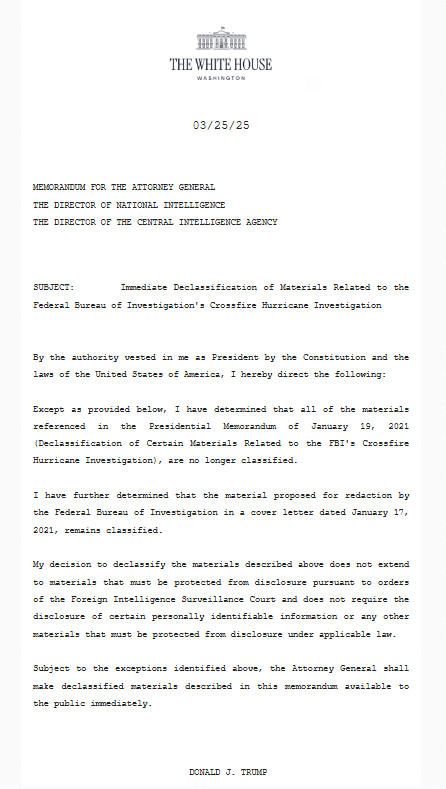On Tuesday, President Donald Trump issued an executive order instructing the FBI to promptly declassify documents related to the Crossfire Hurricane investigation. This probe, initiated in 2016, aimed to determine if there was any collusion between members of the Trump campaign and Russia during the presidential election. The implications of this investigation were far-reaching, raising questions about the integrity of U.S. elections and the role of federal agencies in political processes. The decision to declassify these documents marks a significant moment in American political history, reflecting the ongoing debates surrounding transparency and accountability in government actions.
Trump signed the order and then mentioned that the media could now access investigation files that were previously kept hidden. He expressed skepticism about whether journalists would actually review them. This skepticism highlights a broader concern about media coverage of politically sensitive issues and the potential biases that may influence reporting. As the public is increasingly reliant on media for information, the president’s remarks reflect a distrust that has emerged between political figures and journalists, emphasizing the need for thorough and unbiased reporting in investigative journalism.
“You probably won’t bother because you’re not going to like what you see,” Trump said. “But this was total weaponization. It’s a disgrace. It should have never happened in this country. But now you’ll be able to see for yourselves. All declassified.” These statements underscore the ongoing narrative of perceived injustice from the Trump administration’s perspective. The term ‘weaponization’ suggests that the investigation was not only unfounded but also a deliberate attempt to undermine Trump’s presidency. This narrative has resonated with many of his supporters who view the declassification as a triumph over perceived political attacks.

On July 31, 2016, the FBI initiated a counterintelligence probe to determine if Donald Trump, a candidate for president at the time, or his campaign associates were conspiring with Russia to sway the 2016 election. This investigation, internally dubbed Crossfire Hurricane by the bureau, began to take shape in the context of growing concerns about foreign interference in U.S. elections. The Crossfire Hurricane investigation not only spotlighted Trump’s campaign but also ignited a national conversation about election security, foreign influence, and the vulnerabilities within the American democratic system.
The investigation began shortly after a meeting on July 28, where former CIA Director John Brennan informed former President Barack Obama about a supposed plan from a foreign policy advisor of Hillary Clinton’s campaign. The plan aimed to tarnish Donald Trump’s reputation by alleging Russian security service involvement. This revelation not only impacted Clinton’s campaign strategy but also brought to light the complex interactions between political campaigns and intelligence agencies. The fallout from such allegations can influence voter perceptions and raise questions about the ethics of political maneuvering in the digital age.
In January 2017, former FBI Director James Comey informed Trump about the Steele dossier, which included unverified and scandalous claims about Trump’s alleged dealings with the Russian government. This dossier played a significant role in initiating the investigation. The emergence of the Steele dossier has become a focal point in discussions about the integrity of intelligence sources, the need for verification in sensitive political matters, and the potential repercussions of unverified information on public trust in government institutions.
During the 2016 election cycle, Fusion GPS was hired by Hillary Clinton’s presidential campaign to commission a dossier written by Christopher Steele, a former British intelligence officer. This action raises important questions about the role of private firms in political campaigns and the ethical implications of using opposition research to influence public opinion. The hiring of Fusion GPS illustrates the lengths to which political campaigns may go in order to gain a competitive edge, bringing to light the murky waters of political funding and research.
The ongoing dialogue surrounding the Crossfire Hurricane investigation serves as a reminder of the complexities inherent in the relationship between politics and justice. As we navigate through the evolving political landscape, it is essential for both the media and government agencies to uphold the highest standards of accuracy, transparency, and accountability. The declassification of these documents may serve as a catalyst for further discussion and analysis, fostering a more informed public capable of engaging critically with political issues.
Understanding the Crossfire Hurricane Legacy
As we continue to unpack the implications of Crossfire Hurricane, it becomes clear that its legacy will be felt for years to come. Future generations will study this period as a pivotal moment in American political history, reflecting the intersection of law, politics, and public perception. The lessons learned from this investigation may influence how future campaigns operate and how government institutions function in terms of oversight and accountability.
Furthermore, the impact of the investigation extended beyond the scope of Trump’s immediate circle. It prompted significant discussions on Capitol Hill regarding the need for reform in intelligence and law enforcement agencies. Many lawmakers called for clearer guidelines on the use of intelligence in political investigations and emphasized the importance of ensuring that such investigations are conducted with integrity and transparency. This push for reform highlights the ongoing struggle to balance national security interests with the principles of democracy.
In the broader context, the Crossfire Hurricane investigation reflects the deep divisions within American society regarding trust in government institutions and the media. As the public consumes news about political events, the framing of those events can heavily influence public perception. For example, supporters of Trump argue that the investigation was a partisan attack, while critics assert it was essential for upholding the rule of law and investigating potential foreign interference. This ideological divide continues to shape political discourse and impacts voter decisions in subsequent elections.
Local News Via - MyrtleBeachSC.com








